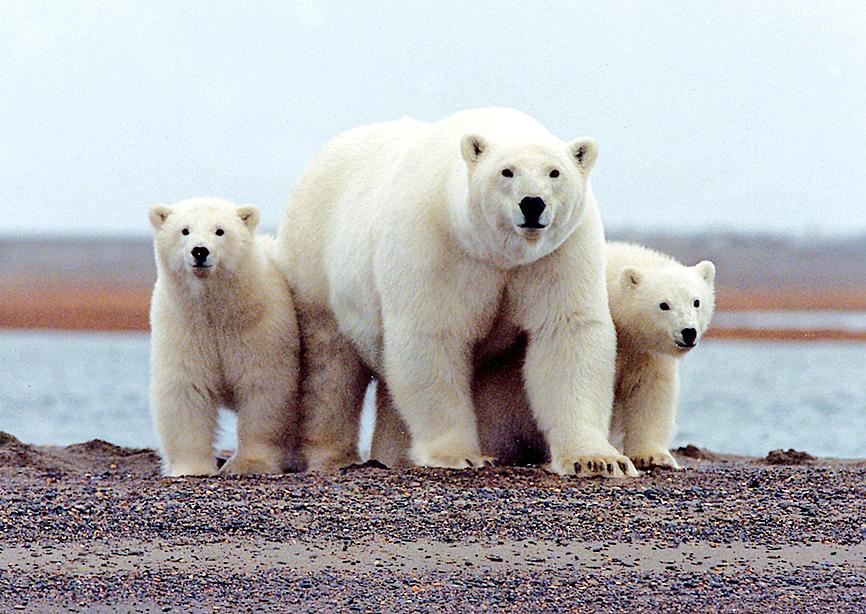Polar bears are increasingly foraging on seabird eggs as climate change shrinks their arctic hunting grounds, but research published yesterday on the phenomenon highlights the struggle the predators have to adapt to their rapidly changing environment.
Dwindling sea ice is cutting short the time they have to hunt seals, their preferred prey.
With a growing imperative to find alternative sustenance, polar bears have been pushed further afield in search of food, including scavenging in areas populated by humans.

Photo: Reuters
Some are also coming ashore at the same time as seabirds are nesting to snack on their eggs.
To measure how efficient the bears were at this foraging — and therefore how useful the eggs are to provide energy in their diets — researchers in Canada used drones to monitor them feeding from common eider duck nests on Mitivik Island in Nunavut.
The study, published in the journal Royal Society Open Science, tracked how the bears approached the nesting site over 11 days as the number of eggs were depleted.
“We found that later-arriving bears increasingly visited more empty nests and did not travel in an energy-minimizing way, but became less picky in the clutches they consumed,” said lead author Patrick Jagielski, of the Great Lakes Institute for Environmental Research at the University of Windsor.
Bears also did not consistently realize that the sudden appearance of a fleeing eider hen meant that eggs were nearby.
“This study demonstrates that, while species are able to incorporate ‘less preferred’ resources into their diet when their primary prey becomes more difficult to obtain, they may not be able to do so efficiently,” the authors wrote.
Jagielski said that the research could not speak more broadly to polar bears’ ability to cope with climate change, but did raise questions about the energy value of eggs as an alternative food source.
There are approximately 25,000 Ursus maritimus left in the wild today in 19 population subgroups distributed across the arctic in Alaska, Canada, Greenland, Norway and Russia.
In July last year, a study published in Nature Climate Change estimated that the species would be starved to extinction by 2100.
Researchers looked at predictions for climate heating and data on the increasing portion of the year that the bears’ must survive on their fat reserves.
Earlier this month, a paper published in the journal Global Change Biology found that polar bears maintained highly specialized diets of soft blubber and flesh for hundreds of years — even during previous periods of arctic warming.
Researchers at Vanderbilt University, who examined dental wear in skulls held in museums, said that polar bears are so specialized in their diets that they might struggle to adapt in a warming arctic.
However, an increase in encounters with grizzly bears could provide one option, as the two species have produced offspring, they said.

A string of rape and assault allegations against the son of Norway’s future queen have plunged the royal family into its “biggest scandal” ever, wrapping up an annus horribilis for the monarchy. The legal troubles surrounding Marius Borg Hoiby, the 27-year-old son born of a relationship before Norwegian Crown Princess Mette-Marit’s marriage to Norwegian Crown Prince Haakon, have dominated the Scandinavian country’s headlines since August. The tall strapping blond with a “bad boy” look — often photographed in tuxedos, slicked back hair, earrings and tattoos — was arrested in Oslo on Aug. 4 suspected of assaulting his girlfriend the previous night. A photograph

‘GOOD POLITICS’: He is a ‘pragmatic radical’ and has moderated his rhetoric since the height of his radicalism in 2014, a lecturer in contemporary Islam said Abu Mohammed al-Jolani is the leader of the Islamist alliance that spearheaded an offensive that rebels say brought down Syrian President Bashar al-Assad and ended five decades of Baath Party rule in Syria. Al-Jolani heads Hayat Tahrir al-Sham (HTS), which is rooted in Syria’s branch of al-Qaeda. He is a former extremist who adopted a more moderate posture in order to achieve his goals. Yesterday, as the rebels entered Damascus, he ordered all military forces in the capital not to approach public institutions. Last week, he said the objective of his offensive, which saw city after city fall from government control, was to

The US deployed a reconnaissance aircraft while Japan and the Philippines sent navy ships in a joint patrol in the disputed South China Sea yesterday, two days after the allied forces condemned actions by China Coast Guard vessels against Philippine patrol ships. The US Indo-Pacific Command said the joint patrol was conducted in the Philippines’ exclusive economic zone by allies and partners to “uphold the right to freedom of navigation and overflight “ and “other lawful uses of the sea and international airspace.” Those phrases are used by the US, Japan and the Philippines to oppose China’s increasingly aggressive actions in the

‘KAMPAI’: It is said that people in Japan began brewing rice about 2,000 years ago, with a third-century Chinese chronicle describing the Japanese as fond of alcohol Traditional Japanese knowledge and skills used in the production of sake and shochu distilled spirits were approved on Wednesday for addition to UNESCO’s Intangible Cultural Heritage list, a committee of the UN cultural body said It is believed people in the archipelago began brewing rice in a simple way about two millennia ago, with a third-century Chinese chronicle describing the Japanese as fond of alcohol. By about 1000 AD, the imperial palace had a department to supervise the manufacturing of sake and its use in rituals, the Japan Sake and Shochu Makers Association said. The multi-staged brewing techniques still used today are